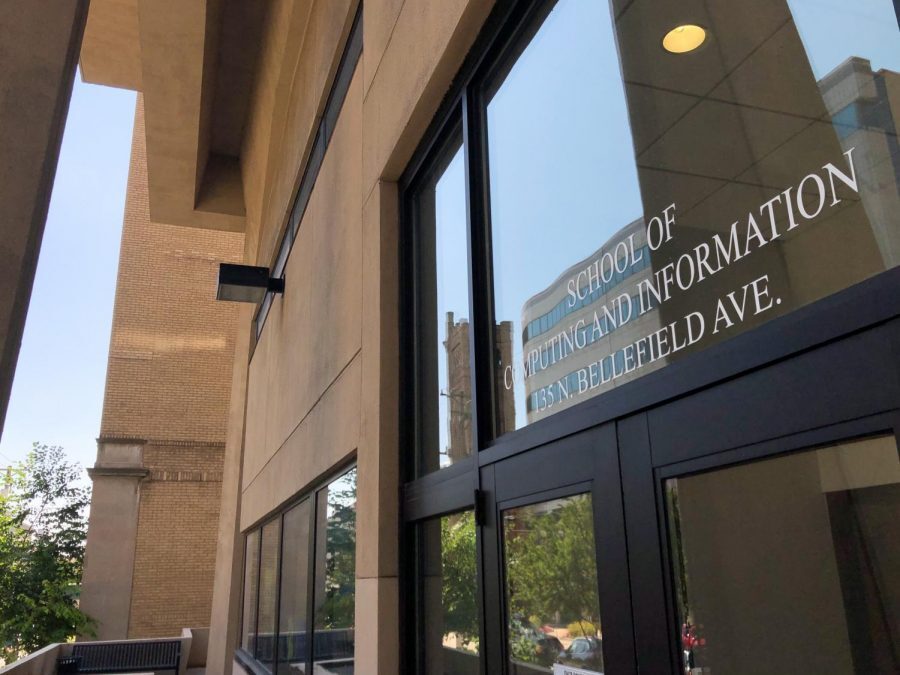‘Sets you apart’: New majors offer competitive job opportunities
The School of Computing and Information building on Bellefield Avenue in Oakland.
September 27, 2022
Before applying to college, Annabelle Cotton, a junior digital narrative and interactive design major, found herself torn between pursuing computer engineering and English and media studies. She did not want to only study coding, but she also did not want to only study humanities.
“I found out there was this major where I could do just about half and half of that — still work with people, but still get to work in a STEM field which was really important to me,” Cotton, a peer advisor in Pitt’s School of Computing and Information, said. “So when I found out Pitt had this major, it solidified my decision to come to Pitt in general.”
Pitt added multiple new majors since 2018 that give students the opportunity to pursue a wider range of careers post-graduation. Majors such as digital narrative and interactive design, museum studies, and public and professional writing prepare students for a variety of positions in the competitive and constantly evolving job market.
Cotton said the University began offering the DNID major in 2019 and that it requires students to take a combination of computer science and English composition courses. According to the SCI’s webpage, the DNID major is offered jointly through the Dietrich School of Arts and Sciences and SCI, and teaches students how to build interactive narrative systems through games, literature, virtual reality environments and other media experiences in a variety of fields.
Maria D’Anniballe, an undergraduate advisor and lecturer in the history of art and architecture department, said the University began officially offering the museum studies major during the 2020 fall semester. According to the HAA department’s web page, students in this program learn about the histories and politics of museology and develop the critical and theoretical tools to take on the ethical complexities of collecting and preserving works of art, visual and material culture.
“[Museum studies] is flexible and it’s interdisciplinary,” D’Anniballe said. “It allows students to envision a career that can have multiple paths.”
Dana Nowlin-Russell, the director of the public and professional writing program, said the University began offering the public and professional writing major in 2018. According to the composition program’s webpage, the PPW major allows students to engage in rigorous intellectual work that will deepen their engagement with writing as a form of social action and professional exchange that has consequences in the world.
“The PPW major is great for students who are going into industries where writing is an essential component of the job,” Nowlin-Russell said. “The major is designed to help students develop skills for communicating within professional spaces and the public sphere.”
Cotton said the DNID major prepares students for future careers in fields such as game design, graphics, user experience, user interface, sales engineering and web design.
“If [students] want to work in a STEM company and do more human interface and experience jobs, this is what you would major in,” Cotton said.
D’Anniballe said the museum studies major is ideal for students who wish to pursue careers in museums or other cultural institutions such as libraries, historic sites, state and federal heritage sites, non-profit organizations or community-based programs. She also said students pursuing a degree in museum studies often double major in another area.
“It’s a major that also allows our students to bridge their interests for art, art history and art objects with other majors,” D’Anniballe said. “For instance, we have a number of double majors who are students pursuing museum studies alongside other majors such as anthropology, communication, history and art history.”
Nowlin-Russell said students can pursue a variety of careers after graduating with a PPW degree.
“From working in nonprofits, universities and public agencies to law practices, marketing and advertising companies, there is so much you can do,” Nowlin-Russell said.
Cotton said during the summer of 2021, she got a job as a sales engineer at ChartMogul, a software analytics company based in Berlin, Germany. She said she helped design advertising for the company and worked on the website. She also said the company sent her to a conference in Silicon Valley for a week where she spoke with customers, gave demos and identified issues with customers that could be edited.
“It was figuring out how to communicate how the tech works to the buyers who don’t have a tech degree, they’re just buyers for their company,” Cotton said.
According to Cotton, if someone is applying for a job in the technology field, coding is a skill nearly every applicant possesses. She said as society has started moving toward more personalized technology and AI, “being well-rounded” is the most important skill tech companies are looking for. She said the DNID major has taught her coding, math, communication and creativity, allowing her to have a diverse array of skill sets.
“That’s what really is going to set you apart, especially in today’s job market,” Cotton said. “It’s what’s going to make you special.”








